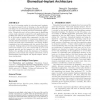Free Online Productivity Tools
i2Speak
i2Symbol
i2OCR
iTex2Img
iWeb2Print
iWeb2Shot
i2Type
iPdf2Split
iPdf2Merge
i2Bopomofo
i2Arabic
i2Style
i2Image
i2PDF
iLatex2Rtf
Sci2ools
CODES
2008
IEEE
2008
IEEE
Profiling of lossless-compression algorithms for a novel biomedical-implant architecture
In view of a booming market for microelectronic implants, our ongoing research work is focusing on the specification and design of a novel biomedical microprocessor core targeting a large subset of existing and future biomedical applications. Towards this end, we have taken steps in identifying various tasks commonly required by such applications and profiling their behavior and requirements. A prominent family of such tasks is lossless data compression. In this work we profile a large collection of compression algorithms on suitably selected biomedical workloads. Compression ratio, average and peak power consumption, total energy budget, compression rate and program-code size metrics have been evaluated. Findings indicate the best-performing algorithms across most metrics to be mlzo (scores high in 5 out of 6 imposed metrics) and fin (present in 4 out of 6 metrics). Further mlzo profiling reveals the dominance of i) addressgeneration, load, branch and compare instructions, and ii) in...
Biomedical Microprocessor Core | CODES 2008 | Lossless Data Compression | Program-code Size Metrics | Software Engineering |
| Added | 18 Oct 2010 |
| Updated | 18 Oct 2010 |
| Type | Conference |
| Year | 2008 |
| Where | CODES |
| Authors | Christos Strydis, Georgi Gaydadjiev |
Comments (0)

